
REBALANCE
REBALANCE project is funded under the 2022 JPND Call for “Understanding the Mechanisms for Non-Pharmacological Interventions”. The project is supported through the following national funding organizations: Academy of Finland, Finland; Brain Canada Foundation; Luxembourg National Research Fund; The Netherlands Organization for Health Research; French National Research Agency and Latvian Council of Science. The project will be carried out during 2023-2026.
Background
Focused ultrasound (FUS) is a non-invasive, ground-breaking technique suggested for the treatment of Alzheimer’s disease (AD). The partners of the REBALANCE consortia have demonstrated therapeutic efficacy for FUS alone and FUS stimulation combined with microbubbles. At the cellular level, FUS promotes transient opening of the blood brain barrier (BBB) and enhances microglial mediated clearance of beta-amyloid (Aß). However, there is a clear lack of studies deciphering molecular mechanisms underlying these beneficial effects of FUS, a fact that limits its full translation into the therapeutic arena.
-
We hypothesize that FUS, through activation of mechanosensitive Piezo1 channels, enhances microglial-mediated phagocytosis of Aß and facilitates the removal of waste from the brain into the blood stream. This occurs through improvement of glymphatic flow together with transient increase in the BBB permeability. Moreover, FUS-induced increase in BBB permeability enables drug delivery into the brain further boosting the Piezo1-mediated clearance of Aß. Together, this concerted reinforced effect of FUS represents a novel approach to improve the impaired brain function in AD patients.
We aim to discover the key cellular targets and molecular mechanisms underlying FUS-induced therapeutic efficacy in AD and to identify pharmacological activation of Piezo1 for combination therapy (combined FUS, cFUS). We will also mechanistically link the cellular players and intracellular pathways responsible for the increase in BBB permeability, enhancement in glymphatic flow and microglia-mediated Aβ clearance and evaluate the underlying molecular, cellular and neuro-glia networks involved in the protection. The specific aims are to:
- Identify the cellular and molecular mechanisms underlying FUS-mediated therapeutic effects in AD with focus on Piezo1 channels and assess the threshold and optimal protocols of FUS.
- Monitor Aβ load, brain cleaning effect, neuronal network activity and behavioural outcome after combined therapy in APP/PS1 mice and correlate the changes to biofluid biomarker profiles.
- Establish Piezo1 as an additional drug target site for combination of FUS with pharmacological activation of Piezo1.
- Investigate the ethical aspects to facilitate transition from the lab to clinics.
-
We use state-of-the-art functional outcome measures including a combination of human-based models and in vivo models to ensure the clinical translation of the preclinical mechanistic evaluation. In addition, we use quantitative and qualitative social sciences methods in the framework of axiological ethical analysis to answer what are the ethical challenges and risks in the process of translation of the preclinical research results to clinical and what are the attitudes, expectations, and perceptions of risk of different stakeholders.
The project is divided into five related work packages (WPs):
- WP1: Mechanisms underlying cFUS induced BBB permeability in vitro and in vivo.
- WP2: Mechanisms underlying cFUS enhanced microglial phagocytosis in vitro and in vivo AD models.
- WP3: Mechanisms underlying cFUS-induced glymphatic clearance of Aβ.
- WP4: Impact of cFUS on neuronal circuit.
- WP5: Ethical framework for translation of the preclinical findings to clinical success.

-
The generated scientific understanding of novel FUS technique for AD patients promotes both academic and industrial research activity and collaboration. The results are also expected to guide the ongoing early phase I/II trials in AD patients toward alternative and more tailored treatments allowing combinatory strategies. Eventually a clinical FUS treatment will have an impact on healthcare cost, public policymaking and current guidelines and recommendations. In addition, the continuous analysis of ethical issues allows the identification of ethical challenges in the R&D process from the point of view of different stakeholders, to minimize ethical risks and to involve patient organizations in a dialog.
-
Annual Meeting 2025, May 26-27, Caen, France
The second REBALANCE Annual Meeting was held in Caen on May 26-27, 2025. The program featured updates from project partners and discussions on future directions. The day ended with a tour of Caen’s historic city center, including stories of William the Conqueror. We also had the opportunity to visit the translational research facilities of our host, Denis Vivien.
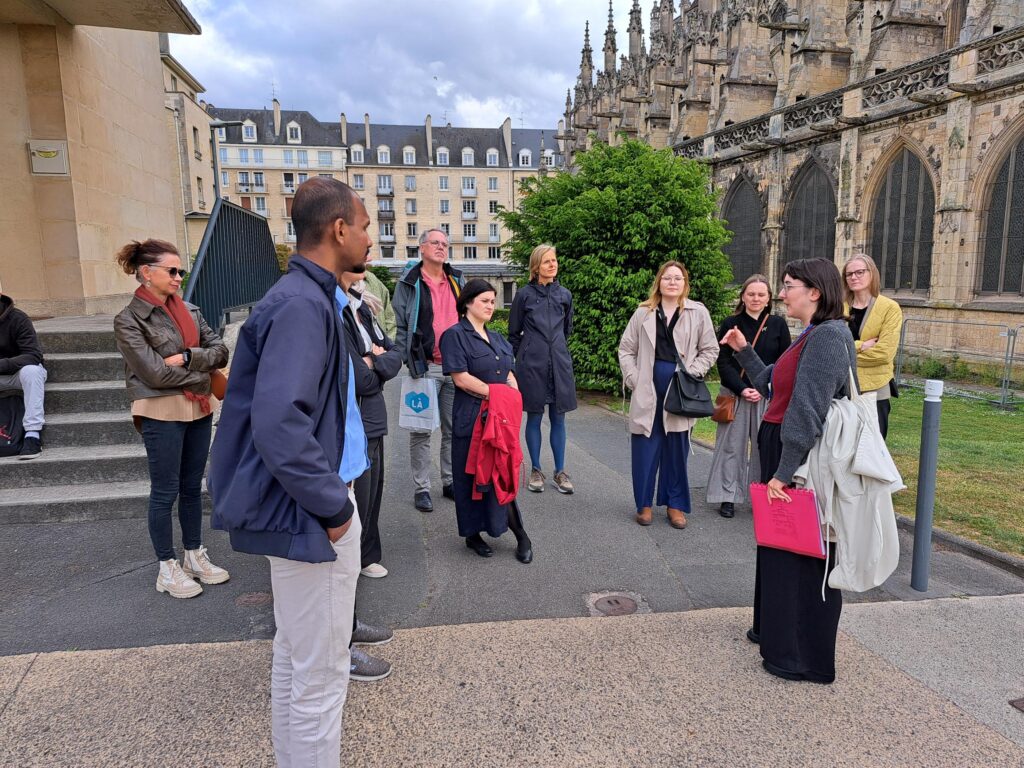
CAEN, FRANCE. 26th May 2025. Annual Meeting 2024, April 8-9, 2024, Riga, Latvia
The REBALANCE Consortium gathered for its inaugural Annual Meeting in Riga, Latvia. This first face-to-face meeting underscored the efficiency and effectiveness of in-person interactions, highlighting the importance of direct engagement and personal connections in advancing our shared objectives. The second day was focused on ethics and Patient and Public Involvement (PPI) activities, with representatives from Alzheimer Europe, including Daphne Lamirel and Sonata Maciulskyte, providing valuable insights from the patient community.
We extend our heartfelt thanks to Signe for her exemplary organization and coordination of the event.

RIGA, LATVIA. 8th April 2024. University of Latvia. -
Tarja Malm, University of Eastern Finland, Finland (Project Coordinator)
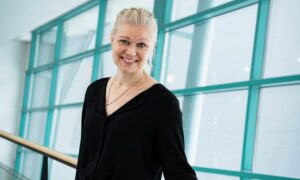
Tarja Malm is Professor in Neuroinflammation at the University of Eastern Finland. The Malm group (https://sites.uef.fi/tarja-malm-group/) aims to understand inflammatory cell functions, especially those of microglia, and the mechanisms and mediators neuroinflammatory reactions. In this project we identify the cellular and molecular mechanisms underlying FUS-mediated therapeutic effects in AD with focus on Piezo1 channels in microglia. We use interdisciplinary approaches and novel, human based models to find novel therapeutic targets for the disease benefit. Our lab develops novel human induced pluripotent stem cell-based models including microglia and organoids to investigate cellular response using omics approaches and electrophysiology. In addition, we combine animal modelling with functional outcomes to clinical patient material and data using bioinformatic approaches. The group consists of 4 senior researchers, 7 postdoctoral researchers, 9 PhD students and 5 technical experts.
Meaghan O’Reily, Sunnybrook Research Institute/University of Toronto, Canada

Meaghan O’Reilly is a Senior Scientist in Physical Sciences at Sunnybrook Research Institute in Toronto, Canada, an Associate Professor of Medical Biophysics at the University of Toronto, and the Tier 2 Canada Research Chair in Biomedical Ultrasound. The O’Reilly group researches ultrasound therapy in the central nervous system, including bioeffects and techniques for delivery, monitoring, and control of microbubble-mediated therapies in the brain and spinal cord through the intact bone. In this project, we will study effects of focused ultrasound on BBB permeability and behavior in the presence and absence of Piezo1.
Arn M.J.M. van den Maagdenberg – Leiden University Medical Center, The Netherlands
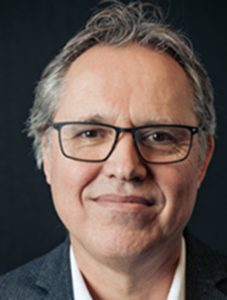
Arn van den Maagdenberg is full professor and holds a Chair in Functional and Molecular Neurogenetics at the Leiden University Medical Center in Leiden, the Netherlands, with affiliations at both the departments of Human Genetics and Neurology. He is a neurogeneticist and neurobiologist. His genetic and functional research focusses on various neurovascular disorders, among which (hemiplegic) migraine and retinal vasculopathy with cerebral encephalopathy with systemic manifestations. In addition, the research aims to understand the relation of network dysfunction and cognitive outcome measures, not only in the context of abovementioned diseases but also epilepsy. To this end he has generated transgenic mouse models that carry pathogenic gene mutations first identified by genetic research in his laboratory and characterises the mutant animals in vivo in freely behaving setups. In the project, his team will investigate brain network circuitry abnormalities by investigating electrophysiological parameters, behavioural outcome measures, and their modulation by drugs and fast-ultrasound modalities. Within the team, basic scientists and clinical research will work closely together. The ultimate goal of the research is to develop better treatment options.
Michael Heneka – University of Luxembourg, Luxembourg

Michael T. Heneka is the director of the Luxembourg Centre for Systems Biomedicine (LCSB) at the University of Luxembourg and the principal investigator of the Neuroinflammation group as well as a board-certified neurologist and clinician scientist. His group (https://www.uni.lu/lcsb-en/research-groups/neuroinflammation/) is interested in the immune component of neurodegenerative diseases (ND) with particular interest in Alzheimer’s disease (AD), but also in Amyotrophic Lateral Sclerosis (ALS) and Parkinson’s disease (PD). One aspect we are looking at is the supportive role of microglia in earlier stages of disease and the formation and function pf tunneling nanotubes (TNT’s) between microglia and between microglia and other cerebral cells. We hypothesize that via these TNT’s microglia are able to support other cells e.g. by taking up aggregated proteins and transferring mitochondria when acceptor cells present mitochondrial damage. We also focus on the role of the role of ASC in Aβ aggregation, the role of the NLRP3-inflammasome and mechanoreceptor signaling in ND as well as in therapeutic antibody development. We study these aspects in different in vivo and in vitro models such as rodents, fish, primary cells and induced pluripotent stem cell (iPSC) derived human induced microglia and neurons as well as in patient tissue samples.
Denis VIVIEN, INSERM – Caen Normandie University and Hospital

Denis Vivien is a Professor of Cell Biology and a Hospital Practitioner at the Caen Normandie University Hospital. He serves as the head of the Blood and Brain Research Institute, a collaborative initiative between Inserm, Caen University, and the Hospital (websites: phind.fr, bb-c.fr, Cyceron.fr). Our group is dedicated to unraveling the pathophysiology of neurovascular diseases, with a particular focus on the tPA-NMDA receptor pathway. To address these critical questions, we employ translational approaches that involve in vivo brain imaging techniques.
In this project, we will explore the functions of Piezo1 channels in regulating inflammatory processes, cerebral blood flows, and cerebral spinal fluid flows. Our research leverages a combination of molecular MRI, MPI, and fast-ultrasound imaging modalities. Our team fosters a robust collaboration between basic researchers, clinicians, and physicists. We have extensive access to experimental animal models and operate an in vivo brain imaging platform.
Signe Mežinska, University of Latvia, Latvia
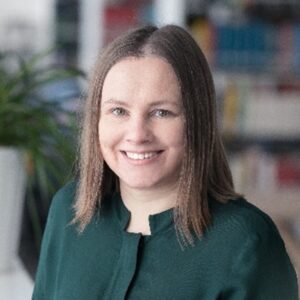
Signe Mežinska (https://orcid.org/0000-0002-3190-100X ) is Associate Professor in Bioethics at the University of Latvia, Faculty of Medicine. In this project Signe leads a work package aimed at building an ethical framework for translation of the preclinical findings to clinical implementation. This work package ensures constant reflection on ethical aspects throughout the research process, reinforcing of ethical principles and values for responsible research and innovation. Our group will also do empirical research on patients’, their relatives’ and stakeholders attitudes, expectations and perceptions and ensure continuous dialog with patient organizations. Based on the results of research, our group will develop informative materials for patients and general public which will be done in collaboration with clinical researchers and Alzheimer patient organizations.
External Collaborators
Else Tolner, Leiden University Medical Centre, the Netherlands
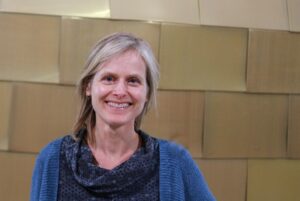
Dr. Else Tolner is Assistant Professor at the Departments of Neurology and Human Genetics of the Leiden University Medical Centre (LUMC), the Netherlands. She obtained her PhD in Neuroscience from the University of Amsterdam in 2005, followed by postdoctoral training in Berlin and Helsinki, studying EEG and neuronal network changes in cortical development and epilepsy. She came to the LUMC in 2011 with an LUMC Fellowship, joining the Leiden Headache Group. Her research focusses on unraveling mechanisms and improving treatments for neurological disorders featuring hyperexcitability, with focus on migraine and epilepsy and using (transgenic) mouse models. Her parallel involvement in clinical EEG studies and human iPSC-derived ‘brain-on-chip’ models allows bidirectional translation of clinical and preclinical findings. In the REBALANCE project she employs her neurophysiological platform for recording brain and vascular activity in freely behaving mice to correlate the impact of FUS-mediated therapeutic strategies on cortical and hippocampal network function with changes in behavior, providing a translational link to future clinical studies.
Jean Georges, Alzheimer Europe, Luxembourg
Katariina Suomu, Alzheimer Society of Finland (Alzheimer Finland), Finland
-
Coordinator: Professor Tarja Malm

Coordinator Affiliation and Contact Information:
A.I. Virtanen Institute for Molecular Sciences, University of Eastern Finland
Email: [email protected]

